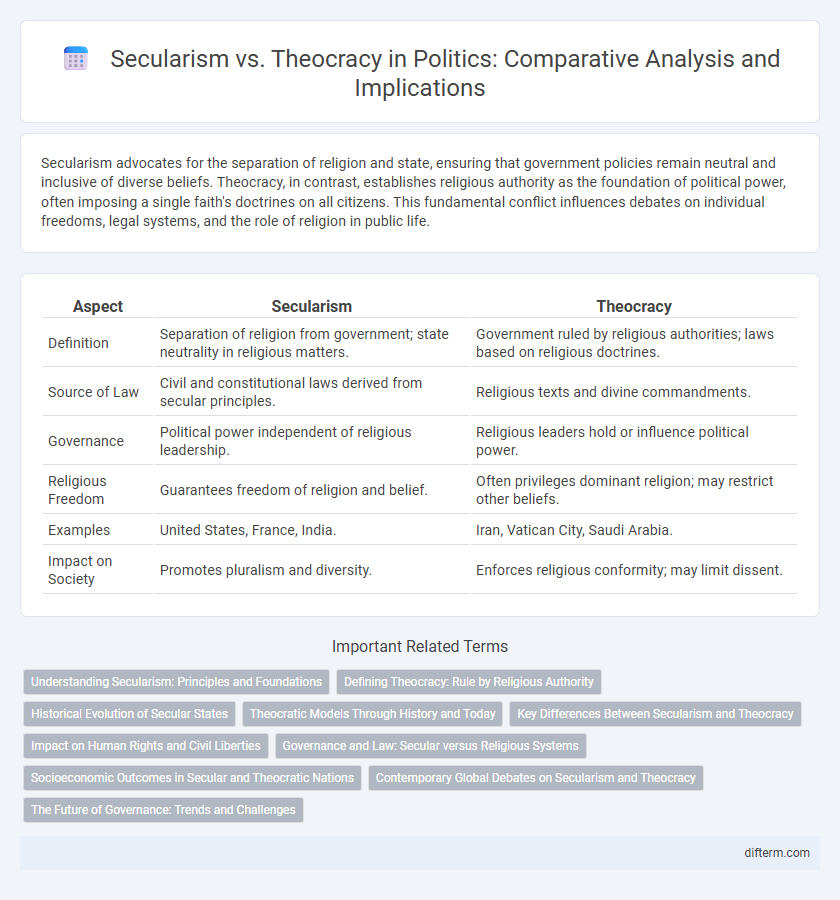Secularism advocates for the separation of religion and state, ensuring that government policies remain neutral and inclusive of diverse beliefs. Theocracy, in contrast, establishes religious authority as the foundation of political power, often imposing a single faith's doctrines on all citizens. This fundamental conflict influences debates on individual freedoms, legal systems, and the role of religion in public life.
Table of Comparison
| Aspect | Secularism | Theocracy |
|---|---|---|
| Definition | Separation of religion from government; state neutrality in religious matters. | Government ruled by religious authorities; laws based on religious doctrines. |
| Source of Law | Civil and constitutional laws derived from secular principles. | Religious texts and divine commandments. |
| Governance | Political power independent of religious leadership. | Religious leaders hold or influence political power. |
| Religious Freedom | Guarantees freedom of religion and belief. | Often privileges dominant religion; may restrict other beliefs. |
| Examples | United States, France, India. | Iran, Vatican City, Saudi Arabia. |
| Impact on Society | Promotes pluralism and diversity. | Enforces religious conformity; may limit dissent. |
Understanding Secularism: Principles and Foundations
Secularism establishes a clear distinction between state and religion, ensuring that governmental policies and laws remain neutral regarding religious beliefs. It promotes freedom of thought, speech, and religion by preventing any one religion from influencing state affairs or legislation. The principles of secularism uphold equality before the law regardless of religious affiliation, fostering inclusive governance and protecting minority rights.
Defining Theocracy: Rule by Religious Authority
Theocracy is a system of government where political authority is derived from religious leadership, with laws and policies closely aligned to religious doctrines. In a theocracy, clerics or religious institutions hold significant power, often merging spiritual guidance with legislative and executive functions. This governance model contrasts with secularism, which advocates for the separation of religion and state to ensure neutrality in political decision-making.
Historical Evolution of Secular States
The historical evolution of secular states traces back to the Enlightenment era, where thinkers challenged the dominance of religious institutions in governance. Key milestones include the Peace of Westphalia in 1648, which established state sovereignty separate from church control, and the French Revolution's promotion of laicite as a foundation for modern secularism. Over centuries, secularism advanced through legal frameworks that enshrined the separation of church and state, shaping contemporary political systems that prioritize individual rights and religious neutrality in public affairs.
Theocratic Models Through History and Today
Theocratic models, exemplified by historical states like the Papal States and modern examples such as Iran, centralize political power in religious authorities, merging governance with divine law. These regimes often enforce strict religious codes, limiting secular freedoms and dissent, contrasting sharply with secular states that separate religion from government. Understanding the persistence of theocratic governance reveals deep cultural and ideological divisions influencing contemporary political conflicts worldwide.
Key Differences Between Secularism and Theocracy
Secularism advocates for the separation of religion and state, ensuring that government policies remain neutral and do not favor any particular religion, thereby promoting religious freedom and equal rights for all citizens. Theocracy, by contrast, integrates religious doctrines directly into the governance structure, where religious leaders or institutions hold political power and laws are often based on religious texts. Key differences include the source of legal authority--people and democratic institutions in secularism versus divine authority in theocracy--and the role of religion in legislative processes, which is limited in secular states but central in theocratic regimes.
Impact on Human Rights and Civil Liberties
Secularism promotes the separation of religion and state, ensuring that laws protect individual freedoms and prevent discrimination based on religious beliefs, which strengthens human rights and civil liberties. In contrast, theocracy often prioritizes religious laws over secular ones, potentially restricting freedom of expression, gender equality, and minority rights. The impact on human rights is significant, as secular systems tend to support pluralism and equal protection, while theocratic regimes may enforce conformity and limit dissent.
Governance and Law: Secular versus Religious Systems
Governance under secular systems emphasizes the separation of church and state, ensuring laws are based on civil principles applicable to all citizens regardless of religion. In contrast, theocratic governance integrates religious doctrines into legal frameworks, often prioritizing divine laws over secular legislation. Secularism promotes pluralism and individual rights, while theocracy frequently enforces uniform religious norms as a basis for policy and judicial decisions.
Socioeconomic Outcomes in Secular and Theocratic Nations
Secular nations typically experience higher levels of economic development and social equality due to inclusive policies that separate religion from governance, promoting diverse participation in the workforce and education. Theocratic states often face limitations in socioeconomic progress, as religious doctrines can restrict freedoms, disproportionately affecting minorities and hindering innovation. Empirical studies indicate that secular frameworks correlate with stronger institutions, better healthcare, and improved human rights, which collectively enhance overall socioeconomic well-being.
Contemporary Global Debates on Secularism and Theocracy
Contemporary global debates on secularism and theocracy revolve around the balance between religious influence and state governance, with countries like Turkey and India grappling with policies that either enforce secularism or allow religious doctrines to shape laws. Key issues include human rights, freedom of expression, and minority protections, which often become contentious when theocracy challenges secular principles. Scholars and policymakers analyze diverse models to address the impact of religious authority on democratic institutions and social cohesion worldwide.
The Future of Governance: Trends and Challenges
The future of governance faces a critical crossroads between secularism and theocracy as societies grapple with maintaining religious neutrality while addressing diverse ideological demands. Emerging trends emphasize the rise of pluralistic governance models that integrate secular principles to uphold human rights and democratic values amid growing religious political influence. Challenges include balancing freedom of belief with state authority, preventing religious extremism, and ensuring inclusive policy-making in increasingly heterogeneous populations.
secularism vs theocracy Infographic

 difterm.com
difterm.com